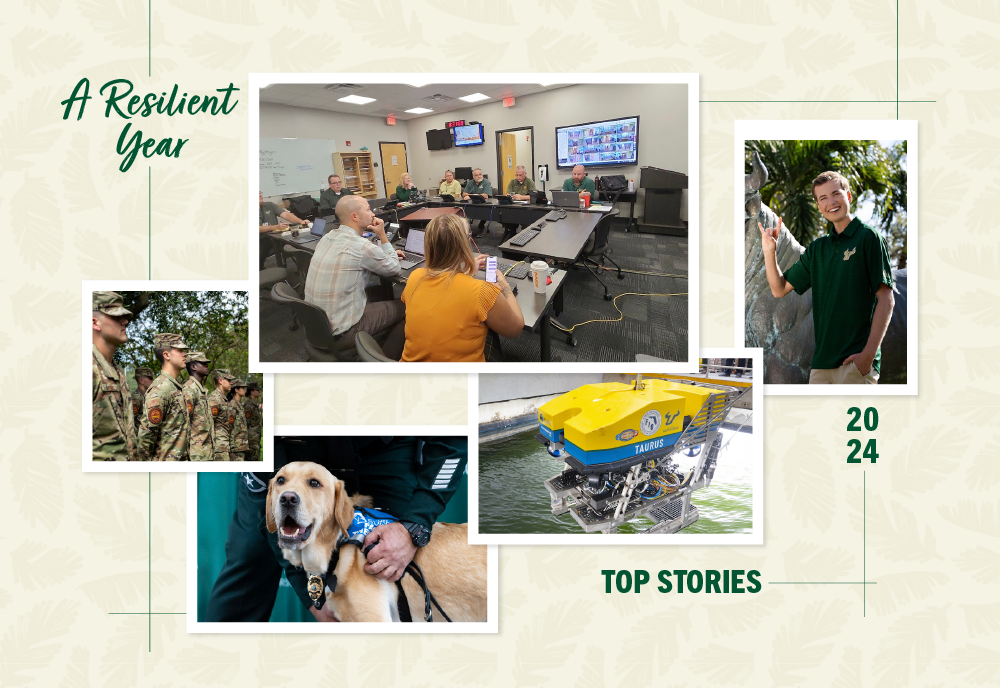By Matthew Cimitile, University Communications and Marketing
This calendar year was full of institutional achievements, international headlines and inventive research. We also witnessed and withstood a historic hurricane season for the Tampa Bay region.
Our campus community came together under those unprecedent circumstances to ensure the mission of the university would continue by quickly restoring operations, mobilizing cleanup efforts and supporting one another.
Throughout the year, students and faculty overcame considerable obstacles and showed tremendous resiliency and creativity to achieve their dreams. Some, through their talents, turned scientific data into music, uniting disciplines and sparking collaborations regionwide. Research activities led to the development of an AI-learning platform that attracted more than half a million users, and a first-of-its-kind study to track the long-term impacts of smartphones, social media and other digital media on individual wellbeing. In addition, thanks to federal, state and community support, the campus is empowered to expand resources for its military-connected students and support the vital work of a research lab that seeks to eradicate human trafficking locally and beyond.
Hurricane response reveals the best in a university community
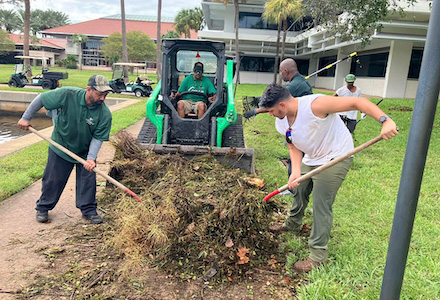
On September 26, Hurricane Helene stuck the Tampa Bay region, generating up to six-to-seven feet of storm surge. Just 10 days later, Hurricane Milton brought nearly 20 inches of rain and 100 mph winds to the city of St. Petersburg.
While the unprecedented hurricane season of 2024 damaged homes and buildings and brought sadness and frustration, it also revealed the resilience and unwavering dedication of the Tampa Bay community. It would result in an unprecedented campus response from many individuals working around the clock and a tremendous amount of teamwork, communication and positive attitude. The response would entail securely preparing buildings, safely evacuating students and temporarily moving classes online.
In the end, it led to a monumental recovery effort to get the campus reopened on back-to-back occasions, just days after hurricanes produced the worst flooding and then the strongest winds St. Petersburg has experienced in a century. More importantly, it would further illuminate the value of the university’s education and research mission and the strength of the individuals that make up the campus community.
Comfort dog Snowbird sworn in as newest member of University Police Department
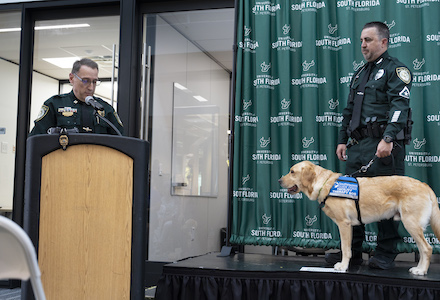
The newest member of the University Police Department (UPD) may just be the most popular officer on campus. He has a badge and rides in a customized patrol car, but that's where the resemblance to his fellow officers ends.
On June 20, several police officers from the Tampa Bay area, their K-9s and representatives from Dogs Inc. gathered on the USF St. Petersburg campus for a special swearing-in ceremony for UPD’s new comfort dog, Snowbird. Snowbird is a facility therapy dog, which means he was trained to work in a facility such as a school, hospital or nursing home to provide comfort, support and therapeutic benefits.
A two-year-old Goldador, a mix between a golden retriever and a Labrador retriever, Snowbird works alongside his handler, Ofc. Mark Lickenfelt, and assists the UPD with calls related to mental health and emotional support in the campus community.
New remotely operated vehicle to advance deep-sea exploration and education
Researchers studying the deep sea have access to a powerful new tool with the acquisition of a sophisticated, remotely operated vehicle (ROV) by USF's Florida Institute of Oceanography (FIO).
Named Taurus, the ROV can reach depths of up to 2.5 miles, allowing for exploration of some of the most remote areas of the ocean and the potential discovery of new species. The vehicle can also capture and livestream 4k imagery, expanding educational opportunities and appreciation for the underwater environment. USF is the only university in the continental United States to own an ROV with such advanced capabilities, positioning it at the forefront of oceanographic research.
The ROV Taurus is being used in several different ways, from conducting new research in deep-sea environments to programs that train the next generation of marine scientists to public education initiatives.
A model for supporting military-connected students
"There is no better place than USF and the Tampa Bay region to have a state-of-the-art facility that connects our student-veterans, ROTC and first responders," state Sen. Jay Collins said. "I know that this will serve as a model for serving veterans and military-connected students' needs in higher education across the state of Florida."
New state funding passed during the 2024 legislative session will go a long way towards enhancing the work of the Office of Veteran Success and making the University of South Florida a model for supporting one of the largest military-connected student populations in the state. A $10 million state investment is leading to new and upgraded OVS facilities on all three USF campuses, benefitting thousands of students as well as first responders.
The $10 million appropriation, sponsored by state Sen. Jay Collins and state Rep. Danny Alvarez, will expand academic, career and health services for this student population. It will include larger shared physical spaces to provide a greater sense of community and belonging, educational support and career training to ensure students graduate on time and find employment, and additional resources for mental health care, mobility access for disabled veterans and service dogs.
Approximately $6 million will go to modernizing a facility to expand the capabilities of OVS on the St. Petersburg campus. This will increase existing services geared toward helping students transition from military to civilian life as well as provide for new endeavors, such as labs dedicated to student-veteran research.
Curious how teachers use AI in the classroom, professor creates popular online platform with half a million users
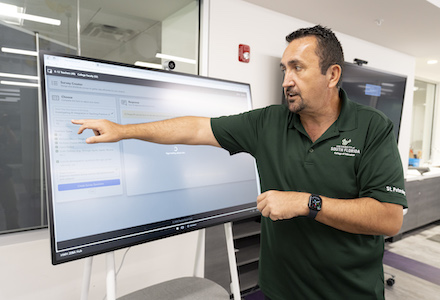
A new online platform featuring more than 850 tools seeks to help educators incorporate artificial intelligence (AI) in the classroom to enhance learning. Created by Education Professor Zafer Unal, TeacherServer provides free AI tools to assist planning, assessment, preparation, research and more.
There are currently more than 500,000 users of the site, who are primarily K-12 teachers and college faculty members. The platform was named Tech Project of the Year by Tampa Bay Tech.
Unal is applying for grants to fund a bigger server to host and expand the online platform. He is also developing additional tools to be added to the platform for high school and college students interested in pursuing teaching as a career. The goal is to assist even more educators in incorporating AI tools into the classroom.
Brain cancer survivor graduates with honors and lasting memories
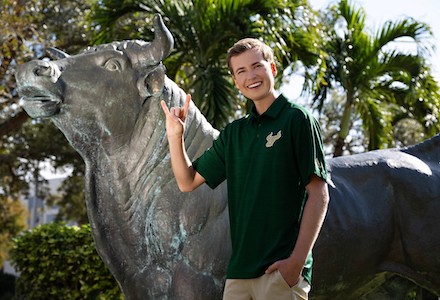
When Cole Eicher graduated in the spring of 2024, he celebrated another milestone: ten years of being cancer-free. In 2014, at the age of 12, Eicher was diagnosed with brain cancer. After weeks of migraines, dizziness, nausea and bouts of double vision, a golf-ball-sized tumor was discovered in the back of his brain. He needed immediate surgery.
Now a decade later, Eicher has not only recovered, but he is also a national advocate for children with cancer, launching an effort that today is the American Cancer Society’s official childhood cancer initiative that has raised more than $11 million.
“My brain cancer operation took place at John’s Hopkins All Children’s Hospital, right next to campus,” he said. “My journey truly feels full circle.”
Researchers begin first lifespan study on the effects of digital media use
“We have research that tracks people across decades, looking at cardiovascular health or work-life balance. We don’t have that yet for digital media use and wellness,” said Justin Martin, the Eleanor Poynter Jamison Chair in Media Ethics & Press Policy and lead researcher of the study.
A groundbreaking new study conducted by the University of South Florida will track young people through 2050 to learn more about the long-term impacts of smartphones, social media and other digital media on individual wellbeing.
Though the long-term research will be conducted over the next 25 years, data collected every six months will give ongoing insight to parents, teachers, researchers, health-care providers and others on the impact of digital media use on children and as they age into adults.
The survey will cover topics such as social media use and addiction, cyberbullying, news consumption, streaming services, parental controls, media literacy, artificial intelligence and more. Examining responses and patterns over time, researchers will discover possible connections between device ownership and time spent on social media with the prevalence of sleep deprivation, anxiety, depression and other critical wellness indicators.
Marine mural adds color and vitality to campus parking garage
A lively and colorful mural of Tampa Bay’s marine environment now spans all seven floors of the campus parking garage.
Painted by Jay Giroux, a visiting faculty member in USF’s Graphic Arts Program, along with several Graphic Arts students, the mural depicts various scenes of the local aquatic ecosystem and numerous marine life. It transitions from the deep sea to the horizon and sky as one moves from the ground floor to the top of the parking garage.
“This setting provided us the unique opportunity of painting a mural across multiple floors, illustrating the various creatures and settings one would see as they move up from the ocean floor,” Giroux said. “I hope the students look at this and gain a further appreciation of the beauty we have around us.”
An interdisciplinary team of faculty and students turns environmental data into music
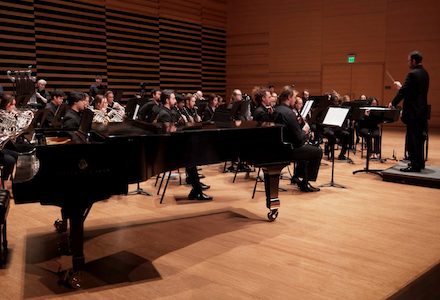
When Heather O’Leary started attending concerts held by USF’s School of Music in 2021, she loved how the performances made her feel, being moved and inspired by the ebb and flow of the music. As an anthropologist, she wondered: could her own data touching on environmental impacts be turned into music that people could enjoy and understand?
Earlier this year, that challenge was met. O’Leary’s research data on the depletion of coral reefs due to Stony Coral Tissue Loss Disease and the impact of Harmful Algae Blooms on coastal economies was converted and performed as a piece of music by the university’s Symphonic Band & Wind Ensemble.
It has now led to CRESCENDO, an interdisciplinary group of faculty and students working together to create and disseminate moving music about the environment.
Estuaries in South Florida are warming faster than the Gulf of Mexico and global ocean
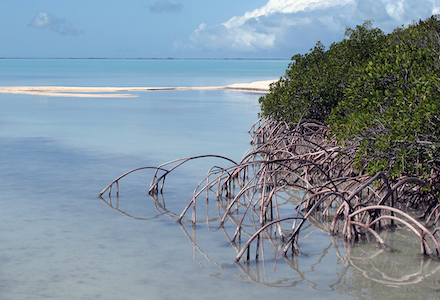
Sea surface temperatures are on the rise around the world, but the problem is pronounced in the estuaries and shallow coastal waters of South Florida.
In South Florida, estuaries have experienced rapid warming over the past two decades. These temperature changes have outpaced trends elsewhere in the ocean, according to a series of studies published by researchers at the University of South Florida College of Marine Science (CMS) and National Park Service.
Using satellite data, the researchers found that sea surface temperatures in four estuaries in South Florida have risen faster than sea surface temperatures in global oceans and the Gulf of Mexico. The findings, published in Environmental Research Letters and Estuaries and Coasts, paint a troubling picture for the marine life that calls Florida home.
Human trafficking research lab receives millions in federal and state support, creates platform connecting victims to critical resources
“By creating and expanding these tools, we will be better able to combat and reduce this illegal activity in Florida while providing essential resources to survivors when they need it most,” said Joan Reid, professor of criminology and director of the TIP Lab.
The USF Trafficking in Persons (TIP) Risk to Resilience Research Lab is moving forward with the creation of powerful new resources to combat human trafficking and aid victims after receiving nearly $3 million in federal spending and $750,000 from the Florida Legislature.
The funds will go towards the development of a statewide database to assist law-enforcement in human trafficking investigations, and the expansion of an online platform to provide critical resources to survivors, such as housing and mental health, as they transition into a new life. The online platform, the BRIGHT (Bridging Resources and Information Gaps in Human Trafficking) Network, launched earlier in the year. Developed by researchers at USF in close collaboration with anti-trafficking professionals and survivors, the BRIGHT Network is an online, vetted, secure resource referral network that helps victims of human trafficking escape their situations by connecting them with organizations and resources in their community.
The TIP Lab is one of the first research centers dedicated to studying the myriad impacts of human trafficking in Florida and works to bridge information gaps in human trafficking, which can help organizations assist victims in locating and accessing services quickly and efficiently.
Launch of online certificate program in fintech

An online certificate program from the University of South Florida is teaching students, entrepreneurs and working professionals about the dynamic and disruptive world of financial technology, or fintech.
Developed by the Muma College of Business, the eight-week program provides a non-technical, foundational understanding of fintech and its impact on the future of business. Those completing the program will receive a digital certificate.
A team of world-class faculty and industry experts designed the self-paced course for those who wish to gain an edge in understanding this increasingly vital topic. The course content covers how technology like blockchain and cryptocurrency are transforming businesses and the confluence between artificial intelligence and fintech.
